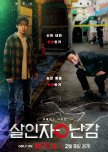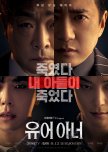
SILLY? YES, BUT NECESSARY...
I started watching this drama with zero expectations. Honestly, the plan was just to kill some time, since it's just another high school Asian drama, right? But then, I found myself getting drawn in. Let me explain: Is the plot cliché and cheesy? Absolutely. Are some of the performances a bit over-the-top? Definitely. But despite that, it was executed so well, and it brought some genuinely valuable life lessons for today's youth—whether they’re from the East or the West.Special shoutout to Mikami Ai, who brought a great vibe to her lead role, and Terajima Shinobu, the veteran actress who played the principal. She gave us some tough love and real lessons about the pain and recklessness of youth.
Overall, the takeaways from this first season align with what Whitney Houston's song "Greatest Love of All" says: "Before you can love someone else, you’ve got to love yourself first. You’re your own priority." Also, getting hurt and going through tough times might suck at first, but those are rare and valuable lessons for growing up.
Esta resenha foi útil para você?

Esta resenha pode conter spoilers
The Fine Line Between Loyalty and Megalomania
Fans' opinions about the game deserve respect and recognition; after all, they have a long-standing relationship with this story, dating back to its very beginning. It’s natural for their evaluation to be more critical, as evidenced by the ratings throughout the mini-series on TVTIME. That said, as someone who has never played the game—though I was aware of its existence—I thoroughly enjoyed the experience of watching the adaptation. Amazon Prime Video deserves praise for its investment and the way it brought this narrative to life.Overall, the script was quite cohesive, despite leaning a bit too heavily on flashbacks. However, these back-and-forth moments in time ultimately converged on a central point, which helped offset that minor flaw. As for the plot, I have to admit I had already suspected that Nishikiyama was the "Demon of Shinjuku." It wasn’t exactly a shocking twist, but the development of his plan, born from the tragedy of his sister’s death, was compelling. It’s a plan tinged with both schizophrenia and megalomania, but it offers plenty of layers for those willing to look deeper.
The mini-series ends with a clear hook for a potential second season. However, given the critical feedback from fans of the game, I wouldn’t be surprised if it doesn’t continue. Still, if it gets renewed, I’ll be first in line to watch.
It’s also worth highlighting the technical excellence of the production: the set design, costumes, and overall atmosphere were flawless, elevating the experience to a visually stunning level. Even with a few missteps in the script, these elements helped solidify the adaptation’s quality.
Esta resenha foi útil para você?

The drama was short, but it entertained me.
There isn't much to analyze about this drama, everything happened correctly and well-done. The CGI of the parasites was just good, nothing spectacular. The performances were good though, however, I found the acting of the actors as parasites to show that they have no emotional and facial expression quite hammy.In my view, it was a closed ending, but with a hint for possible continuation. To be honest, if there is a continuation, I will watch it; if not, that's fine too.
The drama was too short in my opinion.
Esta resenha foi útil para você?

How to ruin a promising drama.
I am seriously reflecting on what they did to this drama that had such a promising and interesting premise. Netflix should understand that the Western audience cares little about whether actor X or Y uses drugs or not. This kind of toxic and strange concern is something that affects Asian society. The intention to reduce Yoo Ah In's scenes harmed the flow of the drama and made the story lukewarm and even a bit boring.It was painful to watch these episodes. I had to watch them little by little. I think I finished these 12 episodes in 60 days or more. And this open, mediocre, and senseless ending? Due to the low impact and the protagonist's situation with Korean justice, the chance of a second season is zero.
Esta resenha foi útil para você?

Esta resenha pode conter spoilers
Do Potencial ao Desleixo: Um Drama que Não Convence
"Um drama com potencial que acabou sucumbindo sob o peso de seus próprios erros". Essa frase resume bem o que foi a experiência de assistir a esta produção. A sinopse prometia um thriller psicológico com camadas, mas o que recebemos foi uma execução que oscilou entre o clichê e o desleixo. Han Seok Kyu, um ator indiscutivelmente talentoso, foi completamente subaproveitado. Seu protagonista, ao invés de conduzir a narrativa, parecia ser conduzido por ela. Passivo, quase apático, ele frequentemente era eclipsado pelo elenco de apoio. Para um perfilador, sua falta de perspicácia em momentos-chave foi frustrante — a antítese do que se espera de um personagem central em uma história como essa.Já Noh Jae Won, como o inspetor Dae Hong, entregou uma atuação que me deixou dividido. Em alguns momentos, sua empatia era comovente; em outros, suas interações, especialmente com o garoto, pareciam desconfortáveis, até mesmo deslocadas. E o final? A revelação da verdadeira assassina foi uma piada de mau gosto: uma expressão debochada na sala de interrogatório e tudo se resolveu? Preguiça pura de roteiristas que claramente esgotaram sua criatividade muito antes do episódio final. Além disso, o arco principal pode até ter encontrado alguma conclusão, mas os secundários foram simplesmente abandonados. Min A foi morta por quê? Porque Kim Seong Hui precisava culpar o professor? E qual era o propósito disso? A lógica desses eventos é tão inconsistente quanto o roteiro que os sustenta. O professor, aliás, prometeu uma revelação que nunca veio. Estamos todos aguardando.
No fim, o drama começou com uma boa premissa, mas terminou de forma desleixada e esquecível. É o tipo de produção que faz você questionar se o tempo investido realmente valeu a pena. Para mim, infelizmente, não sei o que pensar.
Esta resenha foi útil para você?

POORLY DEVELOPED EPILOGUE...
The drama started strong, teasing us with an epilogue of the queen fighting and winning, setting the stage for a gripping conclusion. However, those scenes only resurfaced in the final moments of the last episode. It felt like the writers and editors were telling the audience: "Figure it out for yourselves, the clues are there."With a budget of 235 million US dollars, it’s clear the resources were meant to cover just 8 episodes. But the real problem was trying to fit everything into such a short span. This story clearly needed 15 or more episodes to unfold properly.
The writer overcomplicated the plotlines and ultimately failed to tie them together. In the end, many questions remained unanswered, and the resolution felt rushed and incomplete. It’s as if the mysteries and their solutions were brushed aside, leaving viewers disappointed with a poorly developed epilogue.
Esta resenha foi útil para você?

Esta resenha pode conter spoilers
A Korean work with Tarantino-esque signs
This is one of those dramas that were built piece by piece, a drama where there was care from the selection of the cast, as well as in the purchase of the rights to the Webcomic it is based on. The entire plot up to the final moment of the drama is well tied together, and everything that happened in the drama was developed meticulously by the screenwriter. We must note the well-directed scenes and the quality of direction and characterisation of all the characters.Choi Woo-Sik, although surrounded by some controversies outside of his profession, is a complete actor and knows how to convey the most varied emotions in a dense drama, but at the same time with a comedic and irreverent tone. A work that mixes murders, blood, and comedic elements, in proper proportions, strongly resembles Tarantino's films Django and Kill Bill, where violent humour and blood go hand in hand.
The villain Song Chon, portrayed by the excellent Lee Heen-Jun, was literally built with seven hands, the environment and the people around him made him into this bloodthirsty and ruthless monster. My favourite character was Roh Bin, also played by the excellent Kim Yo-han, who brought life and charm to a heavy drama surrounded by violence. He was another character who life and environment made become this way, a nerdy vigilante who loved Lee Tang fraternally until the very end. His death left me saddened, but I saw it as necessary for the direction the drama took.
Although the ending was slightly open-ended, I understand that the drama fulfilled its purpose and the story does not need any continuation.
Esta resenha foi útil para você?

Wonderhatch: Soratobu Ryu no Shima
3 pessoas acharam esta resenha útil
A waste of time
I'll be completely honest, the impression I have is that I've wasted several hours of my life on this drama. What a boring and bad story, and what was up with the CGI in the final episode? Did Disney produce this drama on a low budget or did they spend everything on Mackenyu's fee? This isn't meant to be a destructive criticism or anything, but Mackenyu's performance is below par. It's all monosyllabic acting with a very dictated script.I like some Japanese productions, but this one will be forgettable for me.
Esta resenha foi útil para você?

Esta resenha pode conter spoilers
Excellent synopsis, but poor execution.
First and foremost, it is necessary to say that Lee JunYoung and Lee JaeWook are among the pantheon of the best Korean actors in their twenties. It's even embarrassing to compare some actors of the same age group with them. That being said, let's move on to the final evaluation. So, does this mean that Tae Oh had no ulterior motive or hidden secret; he was just another one who wanted professional success and money in an honest way, and saw Kang InHa as the ladder to such goals? Confronted about why he did all that to Tae Oh, Kang InHa responded by saying: "I don't know, that's it, I guess it's because you were Tae Oh." That's what's called lazy writing and writers with little creative intelligence. The family's mother, Jang GeumSuk, was arrested for concealing a corpse. I was waiting for the episode to find out whose corpse it was. What's the story behind this? Was the butler also arrested? It was a mess and nothing was clarified. Our protagonist is beyond comments; we've already made enough comments about her during the drama.They turned Kang InHa into a monstrous psychopath who spares not even the relatives of his enemies, and it became clear that Tae Oh was an imaginary enemy he created. Also, that toxic romance between Tae Oh and HyeWon highlighted InHa's unbalanced emotions, and he felt betrayed and isolated. I'm not justifying, I'm just saying that the creation of the monster InHa became has shared responsibility with TaeOh and HyeWon.
The positive highlight goes to the interpreter of Hee Joo, actress Choi Hee Jin, who had little screen time but was the only one who managed to connect with the audience. The moment of reflection was the suicide of now Baek InHa. I confess I was choked up.
Anyway, this drama came with high expectations and an excellent plot, but an execution to forget.
Esta resenha foi útil para você?

How to be a badass and fucking awesome!
It's always interesting when a drama delivers quality in script, text, and acting, but this spin-off becomes one of those cases that go unnoticed by the public, and for a very prosaic reason: its limited distribution to the South Korean territory. The solution? Well, let's just say that many of us had to resort to "alternative means" to watch. How ironic, isn't it? A production that deserves visibility and yet seems to be content with obscurity.Among the highlights, it is impossible not to mention Bong Shik, who turned prosecutor Cho Byeong Gun into an envious and delightfully over-the-top caricature. The actor delivered a performance that alone would be worth the episodes. In parallel, Baek SunHo, with his rookie prosecutor, had few scenes but was precise, offering a striking and objective presence. He wasn't the type of character to steal the spotlight, but his energy complemented the plot effectively.
As for the outcome, there is a certain subtlety that suggests a possible continuation. And honestly, why not? If the level of execution remains the same, it would be a pleasure to revisit this universe. Let's just hope that next time, the distribution barriers are smaller. After all, talent like this deserves to be seen — legally, preferably.
Esta resenha foi útil para você?

Esta resenha pode conter spoilers
GEHENNA PARA TODOS!
Se há algo que define esse drama é a habilidade de transformar temas complexos como inferno e céu em uma narrativa envolvente e executada com maestria. Desde o início, a produção manteve uma precisão e uma qualidade que raramente vemos, com uma sinergia evidente entre roteiro, direção e atuação. Os protagonistas mostraram uma química que saltava da tela, e mesmo as críticas aos beijos precisam ser contextualizadas no componente cultural coreano — especialmente considerando que a atriz principal é casada, o que certamente afeta as escolhas de direção em cenas românticas.O elenco de apoio foi um espetáculo à parte, com coadjuvantes que transcenderam suas funções para elevar o drama a um nível acima. Atores que interpretaram personagens como Valak e Gremory se destacaram com performances memoráveis, trazendo o caos necessário à trama que explora a coexistência entre demônios e humanos.
Quanto à história, o desfecho não apenas foi satisfatório como também deixou entrever uma abertura clara para uma segunda temporada. A declaração do roteirista, sugerindo que o momento para isso ainda não chegou, é um indicativo sutil de que já existem discussões sobre a possibilidade. O episódio final revelou nuances fascinantes, especialmente a dinâmica entre Bael e Justitia. Seu afeto ambíguo, misturado a uma manipulação emocional, faz de Bael um personagem intrigante. Seu desprezo por Han DaOn, humano e, portanto, um rival improvável, adiciona ainda mais camadas à história — principalmente porque o tempo de Justitia na Terra é limitado. Será intrigante ver como ele (Bael) lidará com a decisão dela tornar-se humana.
A performance de Park Shin Hye foi, sem dúvida, de "Masterclass". Com uma precisão quase cirúrgica, ela incorporou os maneirismos e o estilo de fala de On Na Ra, conferindo profundidade e complexidade à personagem. É uma atuação que merece todos os elogios e o sucesso estrondoso do drama. Agora, só nos resta aguardar uma possível segunda temporada…
Esta resenha foi útil para você?

Unnecessary Second Season: The Drama That Should've Ended After One
The curious case of a drama that honestly didn’t need a second season. The entire arc of this season could have been condensed into about three episodes. Combined with the first season, this continuation had zero impact and relevance to what we saw in the initial and decisive season. It felt as though the stories were disconnected, with the only link being the protagonists who, somehow, fell in love in the first season. This romance, forged amidst the insane chaos of a Japanese hospital, seemed absurdly out of place. Who thinks of romance in such a macabre and chaotic environment? These are the quirks only South Korea can provide.The CGI was, to say the least, poor and mediocre. What’s even more astonishing is that we’re talking about a standard Netflix drama. However, not everything was a total loss. Claudia Kim was phenomenal, perfectly embodying a Japanese aristocrat. She was a character who, despite despising human weaknesses such as emotions, harboured a sick and vengeful obsession with Jang. She managed to maintain this contradiction assertively and fully, with lines in Japanese that sounded beautiful, always maintaining a serene and unique tone. Bae Hyeon Seong, portraying Seung Jo, was also worthy of praise. He finally broke away from the roles of innocent and pure characters he usually plays and did very well.
I liked the subtle ending of the drama, suggesting that they would start a new story there and finally leave the past behind. Fortunately, they didn’t leave any room for a third season. We’re done here and that’s it.
Esta resenha foi útil para você?

I PRAY, I ASK FOR THE HEAVEN
I have to admit, I was a bit taken aback by the low rating for the final episode of “완벽한 가족”. I’m not sure what people were expecting from the conclusion, especially since the pacing and plot development seemed like they could’ve fit better in a film rather than a full-length drama series.The entire storyline was built around the drama’s theme song, “TO HEAVEN”, beautifully sung by Jukjae. So, I’m going to break down the song verse by verse and connect it with the storyline. This drama deals with themes of isolation, family secrets, and the constant pursuit of a perfect image, while the characters navigate deep emotions and personal struggles.
First Verse:
Lyrics:
“Quietly, loneliness creeps into me
When will this long day ever end?
The sky I saw while walking with heavy steps
Is dark, as if it’s looking into my heart and painting it.”
Analysis:
The first verse speaks to a deep, creeping loneliness. The feeling that the day drags on endlessly suggests ongoing anguish, a sense that the problems and burdens are never-ending. The “dark sky” reflects the emotional state of the person, symbolizing hopelessness and the weight of their internal struggles.
Connection to the Drama:
This verse mirrors the experiences of the main characters, who seem to have the perfect lives on the surface, yet beneath it all, they carry the heavy burden of maintaining appearances. In “완벽한 가족”, there’s a stark contrast between what the characters show to the outside world and how they truly feel. The drama explores how, despite being surrounded by people, especially the protagonist’s parents, they feel a deep loneliness, which is reflected in their expressions and the “heavy steps” of their daily routine. The “dark sky” represents the secrets that haunt the family.
Second Verse:
Lyrics:
“I close my eyes in silence and slowly count to ten
In the moment I open them, I wish it were all a dream
I pray, I pray, to heaven.”
Analysis:
Here, the lyrical voice seems to seek a temporary escape from reality by closing their eyes and hoping that when they open them, it was all just a nightmare. Praying to heaven represents a search for a way out, a desperate hope that the difficulties will magically disappear.
Connection to the Drama:
In the story, the characters often seem to be living in a dream or an illusion of perfection. The mother, who upholds this facade of family happiness, could be seen as someone who’s constantly praying for that illusion to stay intact, dreading the day when the family’s secrets come to light. This wish for everything to “be a dream” reflects the moments when the drama’s characters yearn to escape the tension and stress that weigh heavily on their seemingly perfect lives.
Third Verse:
Lyrics:
“I let out a sigh bigger than my breath
I try to walk back, but I remain in the same place
My wish, finally written in tears
Yes, I want to go back to the beginning.”
Analysis:
This verse expresses frustration. The lyrical voice is stuck in a repetitive cycle, unable to move forward. The melancholy of wanting to “go back to the beginning” suggests a longing to undo choices or fix the mistakes that led to the current situation.
Connection to the Drama:
In the drama, many of the characters, especially the protagonist’s parents, grapple with regret and remorse. They often question whether the choices they made — regarding their careers, family, or hidden secrets — were the right ones. Like the lyrics, they long to “go back to the beginning” to try and rewrite their lives, free from the mistakes and secrets that now haunt them. This desire for a second chance is a recurring theme in the story as they try to face the consequences of their past decisions.
Fourth Verse:
Lyrics:
“Once again, I’m alone, only my shadow remains
In the moment everything collapses, I wish it were someone’s embrace
I pray, I pray, to heaven.”
Analysis:
In this verse, the lyrical voice feels abandoned, left with only their shadow for company. When everything seems to be falling apart, they yearn for the embrace of another, a sign of vulnerability and a desire for emotional connection. Once again, there’s an appeal to heaven, a plea for divine intervention.
Connection to the Drama:
This verse fits perfectly with the storyline of “완벽한 가족”. The breakdown of family relationships and the loneliness of the characters are central themes. As the facade of perfection begins to crumble, each family member desperately seeks comfort in others. However, much like the lyrics, they often find only their own shadows — a metaphor for the emptiness that surrounds them. The desire for an embrace — a genuine and heartfelt connection — is something the characters crave but rarely find, as they’re all trapped in their own illusions and fears. The prayer to heaven symbolizes their last hope that something, or someone, might save this “perfect family” before it falls apart entirely.
This analysis shows how the song “TO HEAVEN” and the storyline of “완벽한 가족” are deeply intertwined, sharing themes of loneliness, frustration, and the search for redemption or comfort. Just as in the song, the characters in the drama are constantly praying — both literally and figuratively — for their lives to be healed from the secrets and pain that weigh them down. They wish they could go back to the beginning, to find solace, and to overcome the emptiness that surrounds them.
In the end, I hope you find my analysis insightful, and I truly wish that everyone can find their own version of the “perfect family” in the best way life can offer.
Esta resenha foi útil para você?

Esta resenha pode conter spoilers
Did Evil Win? Something to Ponder.
I have very mixed feelings about this ending. On one hand, it feels like the punishment wasn't harsh enough, but on the other, from a more realistic perspective, it was probably the most fitting conclusion.The judge committed atrocities, was directly and indirectly involved in numerous crimes, and played a part in this horrific chain of murders—ranging from children to the death of the officer he cared for the most. And in the end, the true villain, the one behind all this tragedy, got away with just a non-lethal gunshot wound to the chest. For a moment, I wanted to believe the judge had hidden the officer to deliver a checkmate, but that was just wishful thinking.
Both the judge and the mob boss faced their punishments. But was it enough? Some might say no, myself included. However, in terms of representing the harshness of real life, I think it was a fitting end. Did I sense a subtle hint of a second season in the final episode? Maybe. But honestly, it’s probably better to stop here. The takeaway is that trying to put out a spark from hell won't get you anywhere; we must face our mistakes and pay for them.
Esta resenha foi útil para você?

Esta resenha pode conter spoilers
Fan Xian será tornará um Grão-Mestre?
Tenho que dizer que agora tenho um ator chinês favorito: Zhang Ruo Yun. Que carisma e que domínio de cena ele tem! Não é à toa que "Joy Of Life" teve duas temporadas de sucesso tanto em audiência quanto em crítica. O protagonista se destaca de uma forma que prende o espectador, fazendo-o embarcar nas aventuras e loucuras de Fan Xian. Em nenhum momento me senti distraído assistindo aos episódios; pelo contrário, senti que eles acabavam muito rápido, o que me deixava frustrado.
A parceria entre Wang e Fan Xian tem uma química absurda. Desde a primeira temporada, as cenas deles são ótimas e bem desenvolvidas. Senti a ausência de Lin Wan Er nesta temporada, parecendo mais uma participação especial do que um membro do elenco fixo. Os atores Wu Gang (Chen) e Chen Dao Ming (Imperador) estão em outro nível de atuação. É impressionante como declamam seus textos e como a dualidade de seus personagens é apresentada.
Sinto que ainda falta explorar mais sobre os grão-mestres. Quero entender melhor esses personagens. Nas cenas do Templo na colina, ficou evidente para mim que o Imperador é o grão-mestre que se esconde no palácio; ele deu indícios claros disso. Também acho que Fan Xian é o filho favorito dele, mas está bem claro que o Imperador permitiu que a mãe do protagonista fosse assassinada, ou talvez ele mesmo tenha orquestrado isso. Sinto que a terceira temporada não será suficiente para responder todas as questões deixadas pela primeira e segunda temporadas. Quero entender por que o imperador de Qin do Norte é uma mulher disfarçada de homem e quais são seus planos.
Enfim, a temporada terminou com Fan Xian querendo se tornar um grão-mestre e com seu QI restaurado graças a um. Ah, quase esqueci de mencionar: o príncipe da primeira temporada, que era nostálgico, sério e odioso, tem uma personalidade completamente diferente nesta temporada, mais cômica, eu diria. Estou ansioso pela terceira, quarta e quinta temporadas—este drama merece. Obrigado, China!
Esta resenha foi útil para você?







